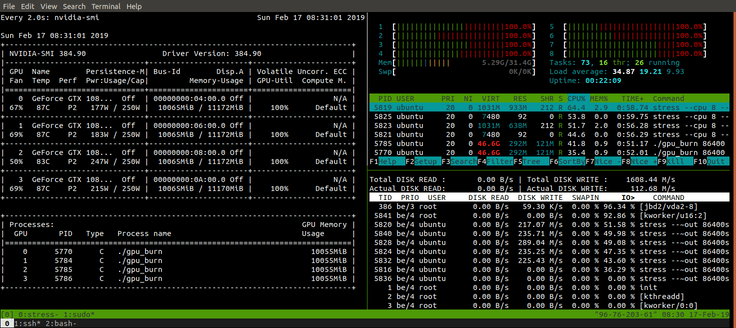Perform GPU, CPU, and I/O stress testing on Linux


Often times you'll want to put a system through the paces after it's been set up. To stress test a system for simultaneous GPU and CPU loads, we'll use two stress tools: stress and gpu_burn, and three monitoring tools: htop, iotop and nvidia-smi. The easiest way to make your own monitoring tool with the output of a script is with the watch command. This article assumes you have the proper GPU drivers in place, check out Lambda Stack if you need to install CUDA, CuDNN, and the NVIDIA drivers.
Install stress, htop, and iotop
On Ubuntu, you can install stress, htop, and iotop via apt-get.
sudo apt-get install -y stress htop iotop lm-sensors
# Run a stress test with `nproc` CPU workers (sqrt)
# `nproc` Virtual Memory workers (malloc / free)
# `nproc` workers calling (sync)
# `nproc` workers writing to disk (write / unlink)
# For a total of 60 seconds.
stress --cpu `nproc` --vm `nproc` --vm-bytes 1GB --io `nproc` --hdd `nproc` --hdd-bytes 1GB --timeout 60sInstall and run gpu-burn
git clone https://github.com/wilicc/gpu-burn
cd gpu-burn
make
./gpu_burn 60 # will run gpu_burn for 60 secondsMonitor with htop, nvidia-smi, and sensors.
I like to use tmux to split my terminal and have htop, sudo iotop, watch sudo sensors, and watch nvidia-smi running simultaneously. You can use this to monitor the CPU, memory, I/O bandwidth, and GPU utilization of your system as well as the CPU and GPU temperatures.
This is a great way to ensure your system is working up to spec.